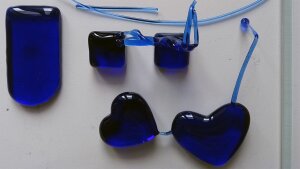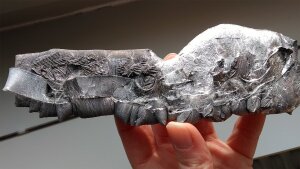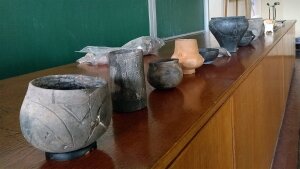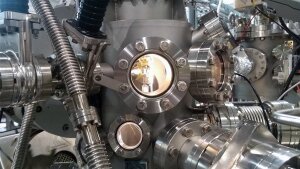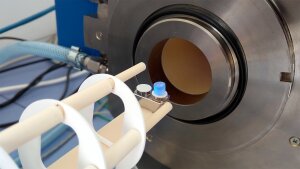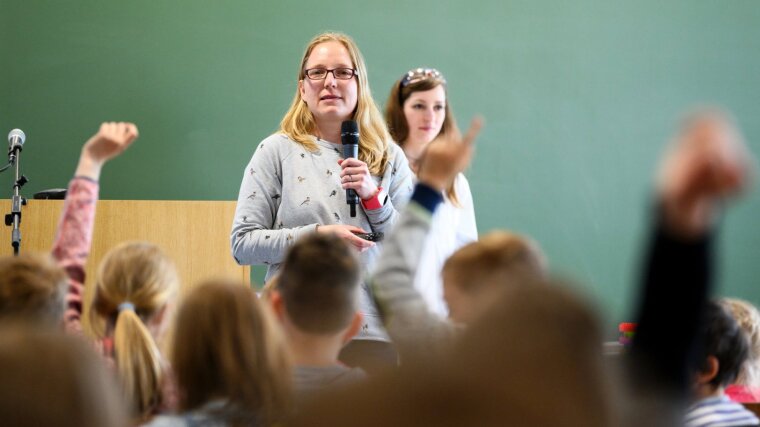
Topics for research projects, theses and student assistants
We continously offer topics for research practicals, research projects for students in materials science, chemistry or chemistry of materials, BSc and MSc theses or for research assistants. Feel free to contact any group member for further information.
Glass II
Cobalt-containing glass
Image: Franziska SchefflerThis course focuses on the atomic structure of glasses and on glass technology. It covers raw materials for glass production, melting and shaping technology, and the structure of various simple glass systems (silicates, phosphates, borates, etc.) and how the glass structure affects glass properties.
The course is part of the Materials Science MSc curriculum (in German). It is taught by Delia Brauer (lectures) and Franziska Scheffler (seminars), and it is offered in the summer term.
Glass Structure
Aluminium and glass slides
Image: Franziska SchefflerThis course covers advanced aspects of glass structure, focusing on more complicated (e.g. aluminosilicate or phosphosilicate) systems or more unusual glass systems (e.g. chalcogenides).
This class is an elective module of the Materials Science MSc curriculum (taught in German or English). It is taught by Delia Brauer, and it is offered in the summer term.
Ceramics I
Antique ceramics
Image: Franziska SchefflerThis course focuses on silicate-based ceramics. It covers raw materials, principles of crystallisation, sintering (liquid and solid phase), ceramic technologies, phase diagrams and structural prinicples in ceramics.
This class is part of the Materials Science BSc curriculum (in German). It is taught by Franziska Scheffler and Delia Brauer, and it is offered in the summer term.
Ceramics in Medicine
Glass eyes from Lauscha
Image: Delia BrauerThis course covers various ceramic materials used in the biomedical field, including orthopaedic and dental applications. Materials covered include calcium phosphates, bioactive glasses, glass-ceramics and inert ceramics (alumina, zirconia).
This class is an elective module of the Materials Science MSc curriculum (in German). It is taught by Delia Brauer and Frank Müller (Department of Physics and Astronomy), and it is offered in the summer term.
Materials Synthesis
Green glass
Image: Christoph Worsch (University of Jena)This course covers core concepts of soft matter (e.g. polymers, hydrogels, polymer colloids) and hard matter (e.g. glass, ceramics, metals, concrete). Students are introduced to methods for the preparation of different material classes, and particular attention is given to the challenges of different length scales (from nanomaterials to surfaces and bulk materials).
This class is part of the Chemistry of Materials MSc curriculum. It is taught by Delia Brauer and Johannes Brendel (Institute of Organic and Macromolecular Chemistry), and it is offered in the summer term.
Chemistry
Solutions in the lab
Image: Christoph Worsch (University of Jena)This course covers the different states of matter, reconsideration of atoms, ions, and the origin of chemical bonds, orbital theory, interparticle interactions, molecule geometries, basic principles of chemical reactions, acid-base reactions, redox reactions and electrochemistry.
This class is part of the Materials Science BSc curriculum (in German). It is taught by Delia Brauer (lectures) and Franziska Scheffler (seminars), and it is offered in the winter term.
Materials Characterisation
SOLARIS Synchrotron
Image: Franziska SchefflerWe are involved in the teaching of Materials Characterisation, which is part of the Materials Sciences MSc first year curriculum. This class provides the technical background and introduces applications of a variety of materials characterisation tools, including thermal anaylsis, X-ray diffraction, Raman and infrared spectroscopy and liquid and solid state nuclear magnetic resonance spectroscopy. The lectures are complemented by seminars, where real life examples will be discussed and real data sets are analysed. This class provides a toolbox of characterisation methods that is necessary for materals scientists.
This class is part of the Materials Science MSc curriculum (in German). Part of the lectures and seminars in the winter term are taught by Delia Brauer and Franziska Scheffler.
Practicals
Heating microscope
Image: Franziska SchefflerWe are also involved in various practicals as part of the Materials Science BSc and MSc and the Chemistry of Materials MSc programmes, including the Basics Materials Practical, Ceramics in Medicine and Materials Synthesis and various research practicals.
